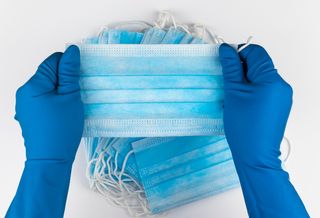Intel and Razer Detail What They're Doing to Fight Coronavirus
We spoke with both companies about their announced plans to fight COVID-19

Late last month, Razer and Intel both announced that they were planning to donate at least one million units of protective personal equipment, or PPE, to fight the coronavirus pandemic, although with different approaches. While Razer began work on converting its factories to produce masks, Intel announced that the company was looking to source existing masks from its factory stock and emergency supplies.
Now, after talking to both New York electronics manufacturer Adafruit and New Jersey boutique PC vendor Maingear about how those companies are adapting to producing protective gear for COVID-19, we got a chance to talk to Todd Brady of Intel and Bob Ohlweiler of Razer to catch up on how these larger companies are addressing their own relief efforts.
Razer’s Approach
“COVID-19 had tremendously impacted the world and we saw that the situation was worsening with the extreme shortage of surgical masks,” Ohlweiler, Razer’s Vice President of Sales and Marketing, told us over email, explaining his company’s decision to begin producing protective gear. “And as a business, we had the means to step up and contribute what we can to fight against COVID-19.”
“To move quickly, we both worked with one of our manufacturing partners to convert a line to produce masks as well as develop a new production facility for mask production in Singapore,” he elaborated. “The line in Singapore will cost approximately $1M and is projected to deliver 2.5M certified masks per month once it is complete.”
That’s a lot more than initially promised, though Ohlweiler went on to say that while the “initial goal is one million masks,” Razer has plans to “contribute more if we can.” According to Ohlweiler, the Singapore production facility is set to be complete near the end of April, meaning that Razer can begin producing PPE soon.
Intel’s Approach
“In response to the COVID-19 pandemic,” Todd Brady, director of Global Public Affairs at Intel told me over email, “we have committed to sourcing and donating more than one million items of personal protective equipment - masks, gloves and other gear to healthcare workers.” However, while Razer is producing its own masks, Brady told me that “This will be sourced from our factory stock and emergency supplies, and we’ll continue to look for additional sources of personal protective equipment that we can source and donate as quickly as possible.”
Stay on the Cutting Edge
Join the experts who read Tom's Hardware for the inside track on enthusiast PC tech news — and have for over 25 years. We'll send breaking news and in-depth reviews of CPUs, GPUs, AI, maker hardware and more straight to your inbox.
Elaborating more specifically on where Intel is looking to source from, Brady said “Some of these items are from the global inventory we have on hand, and we are working with our supply chain to source additional items.”
Just seen this from #Razer Good job guys! Though as a health care worker I’m now longing for a chroma enabled mask 😂 #Covid_19 #razerforlife #forgamersbygamers pic.twitter.com/Cr3tWlfgb7March 30, 2020
What’s Being Donated?
“We will source surgical and N95 masks, gloves, coveralls, aprons, face shields and other critical items that health care workers have requested,” Brady explained. He also added that, while “Intel is not a manufacturer of ventilators, masks or other direct healthcare equipment, our funding programs and non-monetary customer support will help equipment manufacturers increase the availability of their critical products to hospitals and other end customers.” This includes Intel’s recent pledge of “an additional $50 million in a pandemic response technology initiative to combat the coronavirus through accelerating access to technology at the point of patient care, speeding scientific research and ensuring access to online learning for students,” following a previous announcement of $6 million going to “relief efforts in local communities.”
Meanwhile, Ohlweiler told me that “Razer is currently only focusing on masks,” and that the company “may consider other developments in the future.” However, he also emphasized that “In March, [Razer CEO Min-Liang Tan] first kickstarted our #RAZERFORLIFE initiative,” and that “Unlike many fraudulent face masks being produced in haste during this time, we are diligently ensuring our 3-ply masks meet healthcare specifications to offer proper protection.” This includes ensuring that the company’s masks are produced in a controlled environment, properly tested, and eventually certified as meeting ASTM Level 2 (in the US) and EN14683 (in Europe) requirements prior to shipment. Ohlweiler also confirmed to me that Razer is not looking to source existing PPE at this time, but rather focusing on producing its own.
Are there any problems?
Both Intel and Razer were open with me about the issues the companies were facing, diving into the dual challenges of converting factories and dealing with legal restrictions.
“Some countries are not allowing shipments of PPE to leave their borders,” Brady explained to me, while Razer CEO Min-Liang Tan publicly tweeted that “Some countries have even banned the export of masks in face of the dire shortage.”
“This is understandable,” Brady went on, “but also makes it more challenging to operate a global supply chain.”
While Brady didn’t address how Intel was approaching the regulations, Razer’s Ohlweiler went into next steps with me. “The two key areas that Razer needed to quickly get up to speed on was the medical regulatory requirements as well as sorting out the unique supply chain and customs clearance process of getting the masks into the hands of people who need them.”
To do this, Ohlweiler added “For our initial batch, we worked with one of our manufacturing partners to tap experts in the field and acquire specifications and production methodology to get started fast.”

What’s it like in the factory?
In his #RAZERFORLIFE announcement tweets, CEO Min-Liang Tan mentioned “over the past few days, our designers and engineers have been working 24-hour shifts to convert some of our existing manufacturing lines to produce surgical masks.” This, combined with Intel revealing that its PPE stock was being sourced in part by factory supplies, led me to ask both companies how their workers are adapting to the companies' new COVID-19 strategies.
“All of our manufacturing partners and the team on the Singapore line set up work within normal employment rules,” Ohlweiler reassured me. “All of our employees and contractors are adhering to the strict safety protocols of respective nations designed to protect against transmission of the virus.”
Similarly, Brady told me that “Across the global factory network, we are implementing practices in our fabs and assembly test plants so manufacturing employees can safely continue performing critical work on site.” These practices include “increased cleaning of our facilities...staggering shift changes, adjusting meeting locations and schedules, and limiting activities that require close proximity.” Additionally, Brady emphasized that support such as “backup childcare and/or elder care, flexible schedules, and work from home reimbursements, as well as paying our hourly workers” would help keep Intel’s staff protected during this time. The latter refers to Intel's pledge to keep paying its hourly employees and service partners at least through mid-May, regardless of whether their work is needed or can be done during the pandemic.
“For those essential workers that come on site,” he elaborated, “we are providing free meals and have implemented social distancing protocols, enhanced cleaning, and PPE as required or needed to perform essential work.”
How is donation being handled?
I closed both my Razer and Intel interviews by asking each company’s representative if they already have donations lined up, and how they’re being handled.
“We’re reaching out to local health authorities and government agencies to direct us to where the need is greatest,” Intel's Brady said. “In the U.S., donations will be made through state and local health authorities and other community organizations so that they can determine where the greatest need lies.”
Meanwhile, Ohlweiler told me that Razer already has donations lined up. “Min asked the head of each region to coordinate the donation with the goal of having impact in the communities where Razer works. We are already a global company with 16 offices around the world, so we started in the regions where we are located.” He then explained the full list of locations, which includes Singapore, The Philippines, Malaysia, Hong Kong, Hamburg, and the Americas/Canada, among others.
“In the Americas,” he added “our focus has been to donate to health agencies that already have a methodology for prioritizing and distributing protective equipment,” much like Intel. “We currently have masks on their way to Orange County Health Care Association as well [as the] University of California hospital system.
Closing Thoughts
“I have more than 100 people working remotely,” Ohlweiler told us, closing on a personal note. “And this initiative has helped keep Team Razer tightly knit.”
More and more tech industry players are getting involved in coronavirus relief. We’ll be sure to keep up with giants Razer and Intel, as well as continue our coverage of smaller companies like Adafruit and Maingear. With everyone from Apple and Google to local businesses like New York 3D printing company Shapeways getting involved in coronavirus research and relief, hopefully the curves everywhere will continue to flatten and we'll see breakthroughs in viable treatments and vaccines soon.
Michelle Ehrhardt is an editor at Tom's Hardware. She's been following tech since her family got a Gateway running Windows 95, and is now on her third custom-built system. Her work has been published in publications like Paste, The Atlantic, and Kill Screen, just to name a few. She also holds a master's degree in game design from NYU.
Most Popular




